Mason Shinnyo Fellows impact the communities they care about through service. Working closely with an organization of their choosing, fellows design and implement their peacebuilding projects with the support of a mentor on campus.
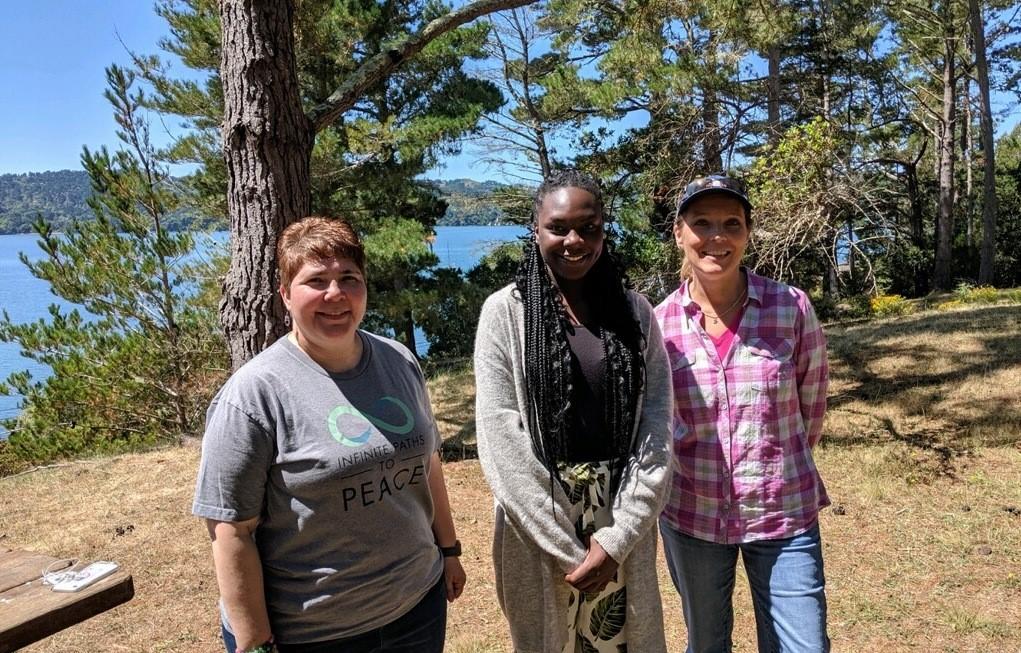
The Carter School's Undergraduate Program and the Shinnyo-en Foundation have partnered to offer a 10-month entry-level paid fellowship to recently graduated undergraduates to serve with a conflict-related or peacebuilding organization.
As a fellow, you'll receive a stipend to develop leadership and reflective skills, and to introduce, implement and/or institutionalize the Foundation’s philosophy of peacebuilding through service in the community and on campus. You'll work closely with an socially minded service organization and with a mentor from the Carter School to design and implement peacebuilding ideas. Your efforts will help you gain skills in project management, networking, community building and ethical practice.
In addition, Shinnyo-en Foundation sponsors the participation of the Shinnyo Fellows and their mentors at the Fellows Summer Orientation and Annual Retreat in August.
Meet Mason Shinnyo Fellows
Oumou Ly, 2019
Oumou served DC Primary Care Association (DCPCA) during her time as a fellow. DCPCA is a non-profit health equity and advocacy organization dedicated to improving the health of DC's vulnerable residents. Her project at Mason was in support of the Global Education Office. Oumou spent her time researching the experience of students of color who study abroad as undergraduates, sharing those findings and exploring ways to improve the student experience.
Alex Schrieber-Heinz, 2018
Alex worked with School Talk DC. This non-profit's youth leadership, restorative justice, and secondary transition programming creates spaces that promote self-determination and a voice for youth with disabilities and their peers by encouraging collaborative problem-solving. At Mason, Alex worked with conflict 490 students supporting students in their capstone research and assisting with instruction.
Dora Najera, 2020
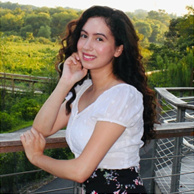
Dora worked as a fellow with USIP’s Gender Policy and Strategy Team, where she helped oversee the systematic integration of gender considerations into the policies and peacebuilding efforts of the institution. Her research focuses on gender analysis across peacebuilding, development, and humanitarian and security fields. Dora worked on a gender micro-course and a gender-based case study that explores how USIP is using gender analysis in its programming and projects. Her gender analysis research focuses on: Women, Peace and Security, Peaceful Masculinities, and Intersecting Identities.
Katherine Strezishar, 2021
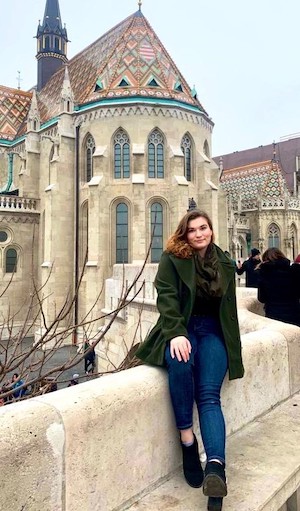
Kate was a Junior Research Fellow with the International Center for the Study of Violent Extremism (ICSVE). She assisted with research and implementation of a methodology to reintegrate former extremists back into the European Union. Kate also worked on a project for ICSVE that focused on the repatriation, rehabilitation and reintegration of foreign terrorist fighters and their families who were associated with ISIS and a project investigating alt-right extremism in the United States. Her Mason-based project was based on media literacy and critical analysis of sources.
Amanda Pena, 2022
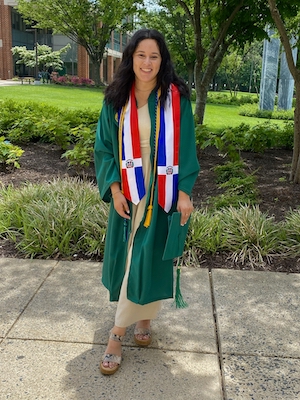
Amanda completed her fellowship work at the Mary Hoch Center for Reconciliation and ThinkPeace. She worked as a Program Assistant and with the Insider Reconcilers lab at MHCR, and at ThinkPeace, developed a pilot course about the wellbeing of practitioners and preventing burnout. According to Amanda, the Shinnyo Fellowship is a nice transitioning period; she loved having something lined up for the year after graduation, but also having a comfortable first step into the "real world."
As a fellow, your projects and activities will include:
- Identifying a community-based partner organization that complements your interests and goals and aligns with the Shinnyo-en Foundation Infinite Paths to Peace and Paradigm of Service.
- Meeting with a Carter School mentor regularly to brainstorm possibilities, set goals, navigate any issues that arise, and reflect on work and growth throughout the year.
- Attending the Shinnyo Fellows Summer Orientation in early August in California, and participating as a facilitator at the Annual Shinnyo Retreat the same weekend (travel and expenses paid as part of fellowship).
- Spending four days a week working with the selected partner organization and one day a week with the Carter School campus activities to recruit future fellows, organize service events, and assist with Shinnyo-en / Mason events.
- Selecting and participating in professional development workshops, lectures, or conferences (travel and expenses paid as part of fellowship).
- Writing two reports, one at the mid-way point and one at the end of the Fellowship to describe the scope and extent of the Fellowship activities including the Fellow's own path to peace that will be shared with the Foundation.
To Apply
Shinnyo Fellowship Application Process
Application Priority Deadline: April 15
Students who graduate from the Carter School's Undergraduate Programs either the fall semester immediately prior to the deadline or the spring semester immediately after the deadline are eligible to apply for the Shinnyo Fellowship.
Interested applicants should submit the following to ugradcar@gmu.edu with the subject line Shinnyo Fellowship:
- Current resume
- Statement of Interest describing how the Shinnyo Fellowship will deepen your commitment to service and contribute to your post-undergraduate goals which includes thoughtful and complete responses to the items below.
- Please review and consider the Shinnyo-en Foundation’s Peace Initiative and Paradigm of Service in your responses. You may also use Six Billion Paths to Peace: Reflecting on the Power of Service and Leadership to Create Global Harmony (PDF) by Harumitsu Inouye, Liane Louie-Badua and Maura Wolf as inspiration for your responses.
-
What community or partnership organization would you like to work with, and what is your vision of service within this community?
-
How does the work and mission of this organization align with your interests and core values?
-
Do you have a previous connection or relationship with this organization? It is okay if this would be your first contact with the organization.
-
Describe an idea you have for a project at Mason that you would like to do as part of this fellowship.
-
What motivates or inspires you to serve? What attitudes, beliefs or values support and sustain you in serving others?
-
What connections do you anticipate making between your work and service with your proposed partnership organization and your degree in Conflict Analysis and Resolution?
-
How will this fellowship contribute to your future career and/or educational goals?
*Virtual interviews will be held for the top three qualified candidates.
For additional questions about the Shinnyo Post-Undergraduate Fellowship, contact ugradcar@gmu.edu
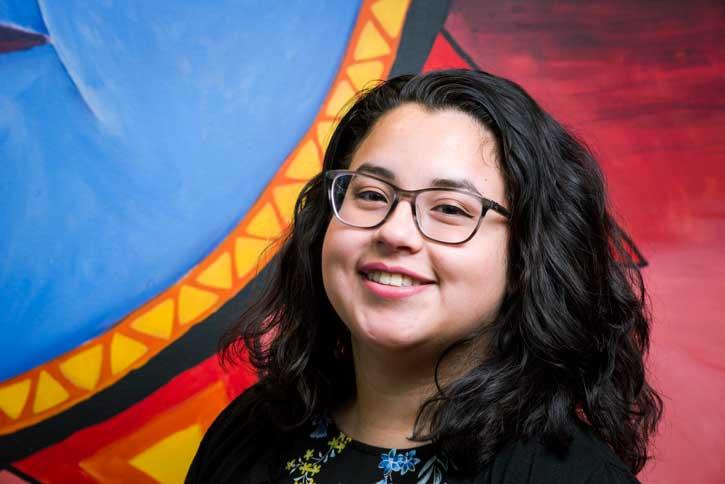
2016 Shinnyo Fellow Genesis Lazo graduated from George Mason University with a B.A. in Conflict Analysis and Resolution and Global Affairs. Her final senior research capstone project on first-generation Salvadoran American students motivated her to use the Shinnyo Fellowship to work with a non-profit agency to further understand and strengthen relationships among the immigrant community in the Washington, D.C. Metropolitan area. Following completion of the fellowship, Genesis continued her work with Just Neighbors expanding her efforts to support immigrants and refugees in Northern Virginia.
